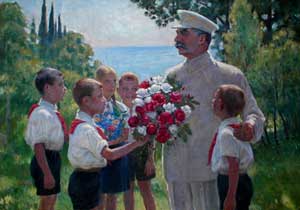
Only recently have similarities between Socialist Realism in the Soviet bloc and broadcast television in the US occurred to me. Why only recently, I wonder. The parallels are many, deep and obvious, especially when one considers the quintessential product of American TV, the sitcom. Like Socialist Realism, it panders to the regime, willingly submitting to ridiculous levels of governmental censorship, and purports to convey everyday reality, and conveys a patently artificial, government-approved dream-world instead. Even the allowed speech is artificial. Artificial obscene words are invented to replace the real ones.
And there is that American pinnacle of artificiality, the laugh track. Viewers can't even be trusted to decide for themselves what is and isn't funny, they must be prompted when it is appropriate to laugh. Thankfully, the laugh track is finally fading away, not appearing in all sitcoms anymore. (Because the Cold War is over?)
Much has also been made (in the US at least) with the troubles had in Communist countries by artists who eschewed the easier success promised by Socialist Realism and produced art which was more serious. As if serious, non-pandering artists have tended to have it easy in capitalist countries!
In his novel Jud Süß, based on the true story of an 18th-century Jewish financier who rose for a while to a position of great power as an adviser to the Duke of Württemberg, only to fall victim to an antisemitic campaign and be executed, Lion Feuchtwanger points out some of the similarities between Germans and Jews. He suggests that perhaps great similarity is a necessary pre-condition for great enmity. The German Duke has nightmares in which he and his Jewish adviser and another Jew hold hands and unwillingly execute a stiff and grotesque dance, inexorably bound together. The financier comes to believe, maybe it's true, maybe not, that his real father was a German nobleman. I wonder whether the US and Russia could ever have been such great enemies if they were not similar in many ways. Those parallels between Socialist Realism and the sitcom, that's just one small example, one symptom, of profound similarities between two huge, relatively new, often crude, extremely powerful nations, similarities which might be much more obvious to most people in Western Europe or Latin America than to most Americans or Russians.
No comments:
Post a Comment